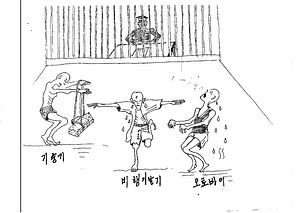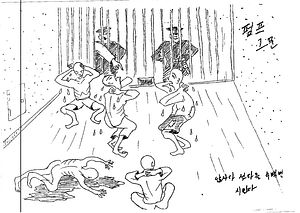Earlier this week, the United Nations’ Commission of Inquiry on Human Rights in the Democratic People’s Republic of Korea accused the Kim Jong-un regime of crimes against humanity, including mass extermination, torture and starvation that drew comparisons to Germany’s Third Reich.
Michael Kirby, a retired Australian judge who spent the past year interviewing more than 300 North Korean defectors, said that reports pertaining to North Korean prison camps bore a “striking” resemblance to Nazi concentration camps.
“At the end of the Second World War, so many people said if only we had known the wrongs that were done,” Kirby, the commission chairperson, added. “Now the international community does know.”
One of the 80 former North Koreans who provided public testimony in the trial was Kim Kwang-il. The 48-year-old spent two years and five months in North Korea’s notorious Jeongeori Prison for crossing the border to sell pine nuts. After defecting to South Korea in 2009, he published a book that contained drawings by professional artists based on his memories of life behind bars.
Kim explained some of the sketches – which were reprinted in the UN report – during the hearing, telling the commission that he “actually got worse treatment than the pictures that are shown in the book.”
According to Kim, horrors begin before an inmate even steps foot inside a prison camp.
“During the interrogation phase, suspects are systematically degraded, intimidated and tortured, in an effort to subdue them and to extract a full confession,” he explained. “The physical setup of the interrogation detention center is often already designed to degrade and intimidate.”
One method of interrogation involves assuming the “crane, airplane or motorcycle” positions. Each requires standing in an uncomfortable position for an extended period of time. Crane, for example, involves holding one’s arms out parallel to the floor with weights hanging from the wrists. Airplane requires a prisoner to stand on one leg with their arms outstretched.
Kim described being forced into the motorcycle position:
We are supposed to think there’s an imaginary motorcycle and we are supposed to be in this position as if we are riding the motorcycle. And if we stand like this there’s no way that you can hold that position for a long time. You are bound to fall forward. Everybody in the detention center goes through this kind of this torture.
He explained that the torture continues until a glass placed beneath the victim is filled with sweat – an excruciating process that can take as long as 10 hours. Each time a prisoner loses their balance or falls to the floor, they are beaten.
A similar kind of punishment is handed down inside the actual prison, known as “pigeon torture.” Inmates are handcuffed behind the back and through a low-lying bar attached to a cell wall, hunched over in such a way that they can neither stand nor sit. Prisoners would often be left in this agonizing position for three straight days.
“[Pigeon torture] was the most painful of all,” said another defector. “[It] was so painful that I felt it was better to die.”
Kim spoke of other desperations – eating snakes and rats to stay alive, sleeping with 70 other inmates in a cell meant for 14, stacking piles of dead bodies on a cart before taking them to be burned.
Being surrounded by constant death eventually took its toll:
Because we saw so many people die, we became so used to it. I’m sorry to say that we became so used to it that we didn’t feel anything. In North Korea, sometimes people on the verge of dying would ask for something to eat. Or when somebody died we would strip them naked and we would wear the clothes. Those alive have to go on, those dead, I’m sorry, but they’re dead, but we become used to this.
The UN commission has promised to refer the case to the International Criminal Court (ICC). Kirby stated his hope that the global community would take action in light of the obvious and severe crimes against humanity.
Pyongyang has denied the charges, calling the inquiry panel “human scum.”
The ball will be in China’s court next month when the report is presented to the UN Security Council. Whether China will join the world in condemning its ally has yet to be seen – but remains highly unlikely.
For a nation that holds tight to the memory of Japanese horrors in WWII, many are hoping that China won’t forget the treachery committed by Hitler and take action against Kim Jong-un and his modern day concentration camps.








































